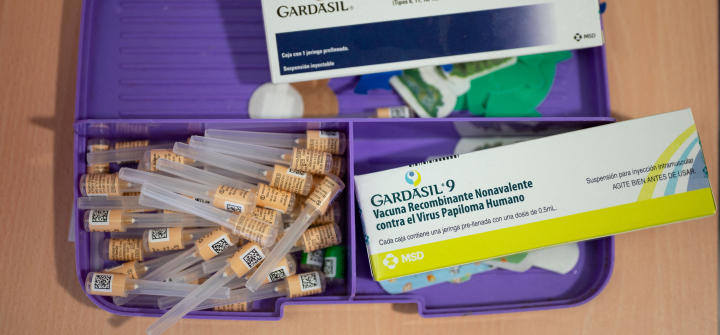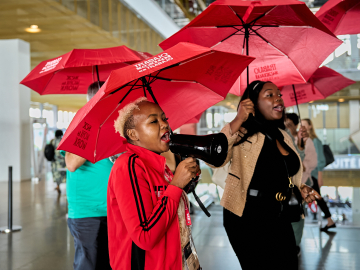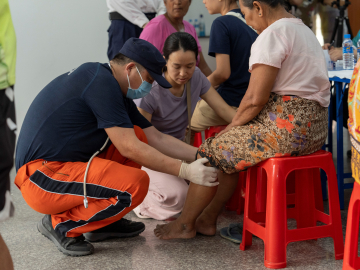Decisive Action Needed to Stop Cervical Cancer Deaths
Although we have the tools to prevent cervical cancer, a woman dies every two minutes from this devastating disease. These deaths are a needless tragedy.
Without decisive action, more than 410,000 women will die annually of cervical cancer by 2030, the vast majority of them in low- and middle-income countries, including our countries of Belize and Botswana.
As First Ladies, we both understand what it feels like to see a loved one suffer from this terrible disease, knowing it could have been prevented. In both Belize and Botswana, cervical cancer claims more lives than any other cancer. Mortality rates are 3X higher in Latin America and the Caribbean than in North America, while sub-Saharan Africa has the highest burden of cervical cancer in the world.
Knowing we have the tools to prevent these illnesses and deaths is heartening. Realizing these tools are unavailable or underused in so many countries is tragic.
Although there are highly effective vaccines against human papillomavirus (HPV)—the leading cause of cervical cancer—just one in five adolescent girls has been vaccinated globally. Fewer than 5% of women in low- and middle-income countries are screened, despite the existence of affordable and effective technology. Many cases are diagnosed late, leading to more difficult treatment and worse outcomes.
Leaders from around the world gathered last month in Cartagena de Indias, Colombia, for the first-ever Global Cervical Cancer Elimination Forum. They announced new and ambitious commitments to turn the tide. Their combined voices, which will catalyze global efforts towards elimination of cervical cancer in the coming decades, give us a renewed sense of urgency.
We have the roadmap towards elimination of cervical cancer. Four years ago, the WHO created a clear strategy and global targets to get vaccination, screening, and treatment on track by 2030. We are making progress but need far more regional and global solidarity in this fight to meet our goals.
We hope our countries can be models for how to ensure girls and women have the information and resources to protect themselves. Belize introduced HPV screening into the national health service in 2022, following the WHO’s recommendations, and is currently conducting a national awareness campaign about the importance of getting screened. Botswana rolled out a national vaccination program in 2015 and will embark on a National Cervical Cancer Prevention Programme in 2024.
We are encouraged by the momentum in the Americas and Africa towards a single-dose schedule for the HPV vaccine, making vaccination programs cheaper and easier to implement and scale. In 2023, PAHO recommended countries in the Americas adopt the single-dose schedule, the first time an entire region has done so. The WHO Regional Office for Africa announced the same recommendation for African nations on March 1.
The convening in Cartagena marks a step in the right direction—but it is not enough.
We cannot rest until governments commit to making HPV vaccines, screening, and treatment affordable and accessible to all communities—and not just in high-income countries.
Community leaders and civil society together can increase awareness and acceptance of HPV vaccines and screening programs, in the process holding their governments accountable to their commitments.
As this issue affects families and communities, we need the men in our lives to stand with us and support us as we go for screening. Finally, as this disease is about people, survivors must be part of the conversation. It is only through their personal stories that we truly understand what is at stake.
As First Ladies from two countries that are far apart but share this unfortunate connection, we will continue to raise our voices until cervical cancer is a thing of the past. We will hold ourselves and our leaders accountable for the promises we make now, so that we can spare our future generations from suffering a preventable fate. We, too, raise our urgent voices of advocacy towards elimination of cervical cancer.
H.E. Rossana Maria Briceño, spouse of the Prime Minister of Belize, is the Special Envoy for the Development of Families and Children and the former Chair of the Spouses of CARICOM Leaders Action Network, the advocacy and action platform aimed at improving the health and well-being of women, adolescents, and children in the Caribbean.
H.E. Neo Jane Masisi, is the spouse of His Excellency, Dr. Mokgweetsi Masisi, the President of Botswana. She is a member of the Organization of African First Ladies for Development and was recently appointed to champion the upcoming National Cervical Cancer Prevention Programme Campaign for Botswana. In addition, she was appointed UNAIDS Champion for the Empowerment and Engagement of Adolescent Girls and Young Women in September 2023.
Join the 50,000+ subscribers in 170+ countries who rely on Global Health NOW summaries and exclusive articles for the latest public health news. Sign up for our free weekday newsletter, and please share the link with friends and colleagues: https://www.globalhealthnow.org/subscribe.
Boxes containing the Nonavalent Recombinant Human Papillomavirus (HPV) vaccine used in the prevention of certain strains of the virus, are pictured in Caracas, on April 28, 2023. Yuri Cortez/AFP via Getty






